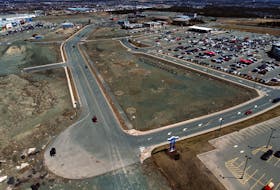ST. JOHN'S, N.L. — Twenty-five-dollars-a-day child care is on its way, as the government touts highlights from this year’s provincial budget.
Premier Andrew Furey, Deputy Premier Siobhan Coady and Education Minister Tom Osborne were at New Dimensions Child Care Centre in Cowan Heights on Wednesday to reannounce the $25-a-day child care commitment in the provincial budget.
Furey says he wanted to see the program in his first two years in office, but the Department of Education found the funds sooner than expected.
“We are thrilled to be able to implement this in a matter of months,” said Furey.
“We want to make it easier for parents in this province, for families in this province. Our government is committed to supporting families, particularly as we navigate through this tough time of uncertainty in COVID-19.”
The goal is to have the program up and running by January 2021.
The cost, as announced as part of the 2020-21 provincial budget, is expected to be between $12 million and $15 million annually.
Furey is hopeful the federal government’s signal of supporting affordable child care throughout Canada will be applied to the provincial system.
“We'll see how we can incorporate their program into ours and make it better," he said.
Furey says taking the cost of child care down to $25 per day is the "first step" toward further action on the cost of child care, but he provided no details about the future program.
"This is a first step to engage in a more healthy child care program. Quebec has the best one currently across the country. We want to be right there, leading the pack," he said.
"This is the first look, the first major investment towards moving towards something bigger and bolder."
Osborne says 70 per cent of regulated child care centres in the province are in line for the expanded operational funding at the moment, with the remaining 30 per cent being encouraged to sign up.
“The new $25-a-day child care initiative will be delivered through the already-established operating grant program,” said Osborne.
“Regulated child care services that participate in the program are provided a grant to offset the reduced fees they charge a family. That grant amount will be increased to allow them to further reduce their fees.”
Osborne encouraged unregulated child care centres to register with the government for regulation so they can also receive funding and make the $25 daily cost universal.
“We’ve accounted for the entire 30 per cent coming on stream, factoring into the announcement,” he said.
“If we get unregulated, it may increase the amount that we need to provide. But we encourage the unregulated to become regulated as well.”
Consultations for both regulated and unregulated child care providers will be launched early in the new year to ensure the program works for them, Osborne said.
“We’ve been dialoguing with some of them already and understand some of the barriers,” he said.
“If there is red tape that is unnecessary, if we can help eliminate some of those barriers, that’s what we intend to do.”
Cost concerns
The Canadian Taxpayers Federation expressed its concern about the potential cost of the program, paired with the existing cost of borrowing crippling the province’s financial condition.
In a news release, the federation's interim Atlantic director, Renaud Brossard, noted 27 per cent of the provincial budget already goes to debt servicing. Brossard pointed to the rising cost of the program in Quebec as a word of caution to Newfoundland and Labrador.
“Quebec’s subsidized daycare system’s costs increased eight-fold since its inception, rising from $300 million per year in 1997-98 to $2.7 billion per year in 2020-21,” reads a release from the federation.
“Quebec’s experience with subsidized daycare shows just how fast costs will balloon up. If the government wants to help families, it needs to get its debt under control and work on reducing their tax bills.”









